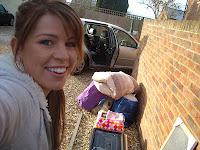
The few possessions I moved
to England with two years ago.
Creature comforts are all that are needed
when you live away for a period of time.
I'll put it straight out there first, that it is NOT easy. Of course every person has different levels of strength in how far they can be pushed out of their comfort zone, so some may be able to cope more than others. If you think you aren't very good at going out of your comfort zone, then firstly GOOD ON YOU for considering the decision to go overseas, and secondly perhaps ease your way into it by training in different states of your own country, or joining a different riding club where you are new, unfamiliar to the environment, and challenged. Leave the language barrier and confusing personality differences out for now.
When I first went overseas to ride a little bit in 2007 when I was 13, I was eased into it with an Aus/NZ Young Rider's tour led by Jenny Carroll. The couple of years folllowing that I did my first German exam, had lessons at the Talland School of Equitation and then spent the next summer living and working at Talland, all before I had even left Australia. I was eased into it gradually, which was a smart thing to do. I was young (aged 13-16) and mobile, without heavy expectations, and had confidence from people saying how brave I was to do what I was doing at that age. I was good at being out of my comfort zone anyway, though it wasn't always easy. I just had enough drive to accept that it was what I had to do, and the world wasn't ending just because I felt a bit uncomfortable. Having 100% support from my family helped a huge amount too. No matter how tought things got, I knew they were always behind me.
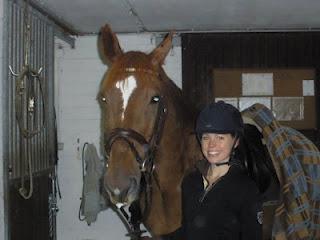
If you have the chance to take your own horse, I reccommend it.
Not only can you advance your horse's and your own training,
but when you need to have a good cry (and trust me, you will)
you can go hide in its stable and let him nuzzle you until you feel better.
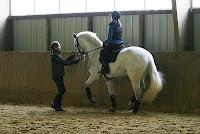
Leonie letting me feel the piaffe on
her Grand Prix horse, Prinz.
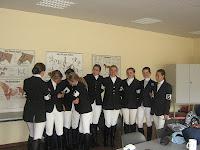
The Little Bronze group on
exam day in Vechta.
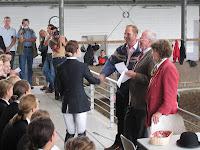
Recieving my Big Bronze medal
at Langenfeld.
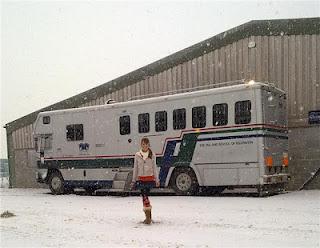
My first day at Talland - January 5th, 2010, 16 years old.
After that day, we got snowed-in for two weeks.
It was a great start.
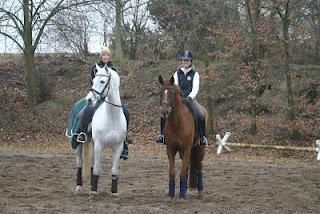
It is a good idea to have either a connection or a relationship
with your trainer established before you head over
to train with them. It creates common ground, and makes
it a lot easier to settle in.
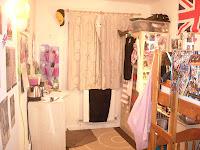
The dramatic transformation of
my student room at Talland
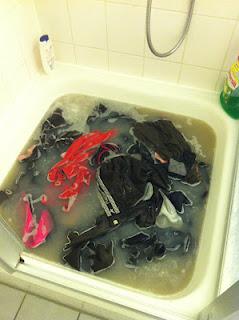
Downside of a hotel - usually no washing facilites.
Hand-washing it has to be then!
Places like Talland with permanent student
accommodation will have a laundry, which although
you have to share, it is extremely helpful.
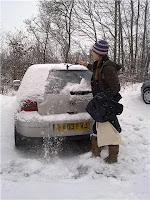
If you decide to take your
own car, be prepared in the
winter with snow tyres
(compulsary in Europe),
anti-freeze screenwash and a
damn good ice scraper.
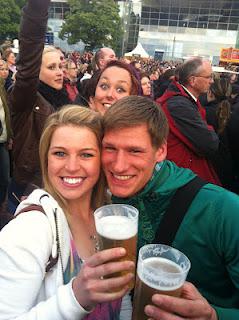
Going out is fun, but you wouldn't want
to do it too often if you're training hard.
Save all of your beer money for one, good
night or weekend, like the music festival
I went to in Hannover in June.
I don't have any cooking facilities, only a fridge and a kettle, so it is quite easy to live cheaply off food. I buy bags of fruit and vegetables and salad, because they are the healthiest and cheapest thing to buy in bulk, and because you have a lot of it you are more inclined to eat it. I try not to fall into the trap of buying junk just because it's quick and easy. Tinned tuna is a no-brainer - cheap, keeps for an eternity, healthy, protein, versatile. I love my tuna. Sliced ham, philadelphia, crackers or sliced bread works well and cheap.
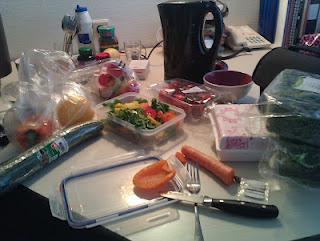
Meal time in Casey's Hotel... salad galore,
no cooking required...nomnomnom.
Peanut butter is a good investment because if you can't eat that much but need energy and calories, peanut butter is your man. Put it on bread, crackers, apples, celery, or by the spoon, it keeps you full! Unless you are superhuman and can get by fueled only by fruit and vegetables, you need to have some proper meals to keep you going. It is easy to make a proper meal when you have cooking facilities, in which case common sense kicks in: Buy some steak and potatoes and bob's your uncle.
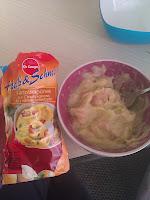
Mashed potato - just add boiling
water! I added ham for extra
taste, and it was quite yummy
despite appearances...
Alternatively, you may be lucky to just have all your meals cooked for you wherever you are staying, which is pretty much a given in the places with the student accomodation. It was fantastic to have a full time chef at Talland to serve us breakfast, lunch and dinner. We were well and truly well-fed. In Germany some riding stalls sit down for breakfast, lunch and dinner together, with often basic food, but nutritious and energy supplying. Easy, but for a price. It is also easy to stop at a bakery on the way to training if you are living in town, and buy a roll or two for lunch.
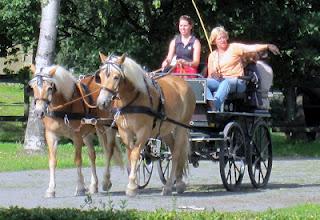
You can find yourself doing things you would never get the chance
to experience if you didn't put yourself out of your comfort zone.
Did I think I would ever drive a horse and carriage? Nope, but at Langenfeld,
I did!
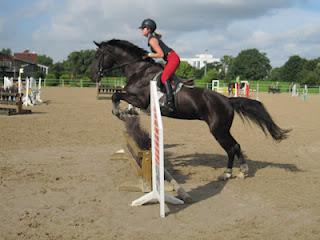
I also would be a complete numpty at jumping if my BHS and German exams
hadn't thrown me into the deep end. Handing me a jumping horse,
they pointed at a fence and said "jump". Now, it is something I enjoy just as much
as dressage itself, and always incorporate it into my own horse's training.
So, that is all of the practical aspects covered. The emotional aspects? Well, I already said it would be hard, and the best thing I can do is give you a list of tips to keep in mind when things get tough:
- No matter how useless you are made to feel, you are already better than before by being there, and not at home in your comfort zone. Some of the most important lessons are the hardest and the ones that make you feel like absolute rubbish.
- You have taken a step further than what most riders would. You are not mediocre, you have crossed that line. You now have more experience than what you had before.
- Don't worry about feeling lonely. Embrace the time you have away from your daily life and use it as a chance to reflect. Who are you enjoying being away from? What do you do at home that you really don't miss, and what have you found you really do miss? Sometimes these answers surprise you, and make you realize what you really need in life.
- If you really do get bored or lonely, take up a little hobby. For example, blogging, researching something you have always been interested in, knitting, even learning the language of the country you are in. Use the time to organize everything you are going to do when you get home with your horses. Is their feed in check? Do you really know what if what you are feeding them is balanced? Take the time to do the maths and research on it - I just sent my poor mother an endless email about feeding options for when I get the boys home to England.
- Keep in touch with loved ones through Whatsapp, Skype, email, Viber, Facebook, twitter, whatever you use. I talk to my boyfriend everyday for free on Whatsapp, and Skype a few nights a week. I talk to my family several times a week and have about three email conversations going on at one time with my mother. It gives you a feeling of support even when you are apart from them.
- Be open to make new friends. Plenty of people are out-going and willing to make you feel more welcome in the foreign country, so be adventurous and accept invitations to go out with them and socialise (if you feel safe doing it, of course!).
The biggest thing I have learnt from all my time away training, is that no matter how other people treat, train and feel about their horses, you are unique in your own way of what you do with them. Take on board positive aspects you see in people, like compassion and patience, and learn what not to do from people who present less desirable qualities when dealing with horses. Don't let these people get to you, it is their decision to work with their horses in that way and they will deal with the consequences of it. You will probably get kicked out if you try to tell them how they should be doing it, so I don't recommend that. If you feel that strongly about how the people that surround you treat the horses or the environment they are in, leave. Don't go back and don't gossip about it, just leave quietly and move on. The best you can to for the equine industry is take what you have learnt from these places, and treat your own horses with the respect and compassion they deserve and educate others who seek it to do the same. If you never know what is wrong, you never know what is right.
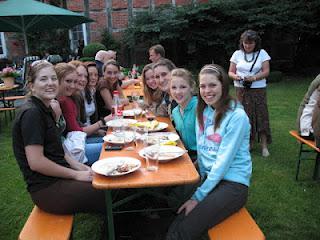
The people you meet when you put yourself in new surroundings
are always memorable. They make the experience what you remember it as.
Sometimes you make friends for life, and sometimes you meet people you
never want to cross again. It is all about personal experience and character building.
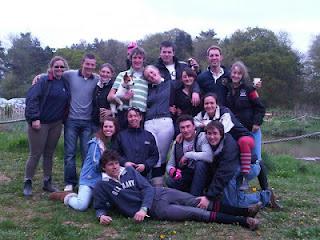
Talland group 2010 - such good memories
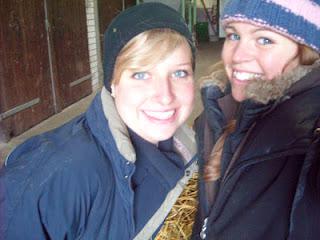
Steff is definitely a friend for life after meeting her whilst training
at Leonie's in 2009. Also from Australia, we clicked straight away!

